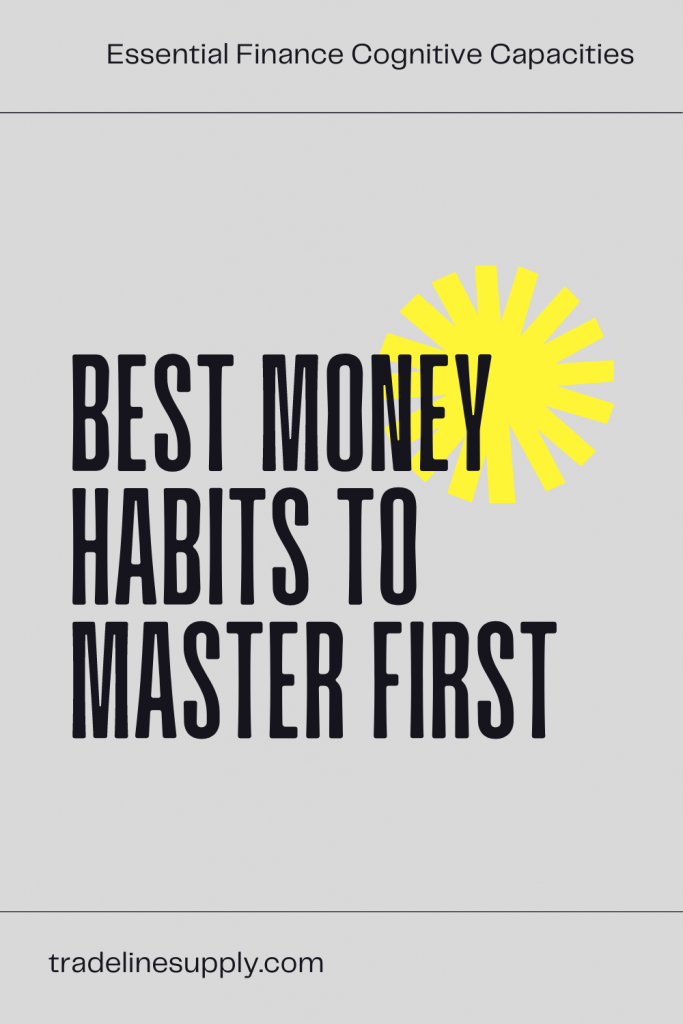Four Best First Money Habits to Master

Insider’s Guide to Buying Credit Repair
11/03/2024
4 More Master Money Habits for Wealth: Essential Money Cognitive Capacities
11/15/2024 If you can’t seem to keep hold of your money, and always feel just a little bit behind, it can be very easy to paint a narrative that you’re bad with money. And while that may feel like it’s a fact, it’s actually a belief that’s limiting the life that you could have.
If you can’t seem to keep hold of your money, and always feel just a little bit behind, it can be very easy to paint a narrative that you’re bad with money. And while that may feel like it’s a fact, it’s actually a belief that’s limiting the life that you could have.
Instead, we recommend you look at these four essential money cognitive capacities and see where you can improve. The goal of this article is to help you reframe the narratives you have around money and hone in on a better approach.
Key takeaways:
- You’ll learn four key money habits you need to master wealth.
- You’ll learn how to approach money more effectively.
- You’ll learn how to have a better framework about wealth that will help you achieve your goals.
The Right Sustained Money Attention for Wealth
Sustained attention is the ability to focus on one thing for an extended period of time. It’s the core building block to learning about something. Without attention, you can’t devote energy to a task.
What does this mean for your money? It means that you have to spend time with your money to get to understand it better. Spending time with your money allows you to do several things: track it, manage it, and grow it.
Problems You Might Have Without Sustained Attention

If you haven’t practiced having sustained attention before, it may feel cumbersome and overwhelming. The world we live in is designed to instantly gratify us. That’s why online shopping, video games, and social media are so enticing. The problem with money is that it’s slow to make changes. We aren’t going to see the changes we make with our money automatically.
How We Can Grow Our Attention Spans
Practice. You won’t naturally want to spend a couple of minutes every week checking in with your money, but building that habit will keep your spending on track and allow you to progress toward bigger, more exciting goals.
Have an accountability buddy. Money doesn’t exist in a vacuum. Your friends have money goals that they want to achieve, too. Ask them if you want to work on your goals together. Having someone in your corner will help you maintain attention on your finances.
What Will Sustained Attention Do for Our Money?
It will keep us focused on the big goals we have in mind. Money is meant to be managed. We need sustained attention to help us manage our finances so that we can accomplish what we want. If your goal is to save $6,000 this year, you’ll need to stay focused and set aside $500 every month. Letting your mind get sidetracked might keep you from reaching those big goals.
It keeps our spending from being bloated. One of the reasons I love sustained attention for my finances is that it forces me to track my spending. I don’t like seeing that I’ve spent a bunch of money on things I don’t need. When I see my miscellaneous category creeping up, I naturally curb the spending.
Money Response Inhibitions That Help You

Having good response inhibition allows you to stay focused on the task at hand instead of getting distracted. Someone with good response inhibition will stay focused despite distractions, while someone without good response inhibition will not.
What does this mean for your money? Building the skill of response inhibition will allow you to stay focused on your financial goals even with strong financial distractions. We live in an age of clever marketing that is designed to help you spend money and feel good about spending that money. Resource inhibition allows you to sort through the marketing and only buy things you actually need.
What Problems You Might Have Without Response Inhibition
You’ll have so many spending problems if you don’t hone in on response inhibition. You’ll get frequently distracted by deals, colorful marketing, and last-minute add-ons to your already full cart. It’s an easy way to find yourself in a world of financial trouble, especially if you’re using credit cards to fund these purchases.
How to Build Response Inhibitions
If you find yourself spending money consistently, then I’d recommend setting up a 24-hour rule. Place items in your cart, and then log out. After waiting at least 24 hours, ask yourself if you still want to purchase those items. More often than not, you’ll end up deleting the cart and saving money.
Create a “fun money” category in your budget to spend on frivolous things. this allows you to give in to your whimsical purchases without damaging your budget. If you pair this technique with sustained attention, you’ll be able to track how much fun money you have left to spend.
Put the money you want to spend in savings. Train your brain that saving money is fun. If you save money every time you want to spend money frivolously, then you’ll put your savings goals into hyperdrive mode. Small savings shape your money when you apply this tactic instead.
What Your Life Will Look Like With Response Inhibition
Response inhibition has the ability to change your life. Training your brain to focus on long-term savings goals instead of short-term, endorphin-inducing purchases will give your wallet a new life. You’ll start to see a shift in the way you look at money and how you manage it.
Speed of Money Information Processing: How Fast Can You Process Money Information?
The speed at which you process financial information affects how quickly you’ll start to grasp your own money. At first, it’s going to be slow. Brains take longer to process and categorize new information. But as you become more financially literate, you’ll be able to compute more complicated financial information at faster speeds.
Why Slow Financial Information Process Can Be a Hindrance
A lot of people say that they’re bad with money when what they really mean is, “It’s hard for me to manage my money because I don’t understand it.” This mentality may be a result of slow information processing. But just because it takes you a while to understand it doesn’t mean that it isn’t possible. Learning to manage money is like learning a new language. Difficult at first, but exciting once you start to understand.
What You Can Do to Process Money Information Better
The best thing you can do to process information about money better is to start with small chunks of material at a time. You can’t save $100,000 if you don’t know how to budget correctly. And investing is complicated if you don’t understand the basic principles of money.
I recommend starting with budgeting. Budgeting is the building block to every financial goal. Once you’ve started to budget, you can look at different money goals. Do you want to learn how to pay off debt? How to save? How to invest? Don’t tackle all three of these at a time. Start with one and move forward from there. Soon you’ll be processing money information like a pro.
How Your Money Will Change With Better Information Processing
Information processing is the building block of learning. Even if you’re a slow processor, you’ll be able to work through the foundations of money management and learn them at a speed that works for you. The more you understand, the easier new topics will be to master. Take your time and soon you’ll be a pro at saving, investing, and achieving your financial goals.
Cognitive Flexibility: Can You Change Your Mind on Key Money Issues?
Cognitive flexibility and control are the ability to change your mind about money. This presents itself in several ways. First, you need to be able to assimilate new information and replace erroneous information where needed. Second, you need to be able to switch between topics and maintain an understanding of both. Third, you need to be able to pivot on projects to see the best outcome.
What Happens if You Can’t Change Your Mind About Money?
If you’re unable to change your mind about money, you’ll run into a thousand small problems. The first is mindset. You need to be able to believe that you can become good with money even if you previously believed you were not good with money. Without that shift, none of the other tools will help. Also, you need to be able to shift priorities. If you can’t, you’ll wind up in a bad money situation where you feel stuck with a budget that doesn’t suit your needs anymore.
How to Create Cognitive Flexibility Surrounding Money
Find places where your mind is stuck. Maybe you think you’re bad with money. Or maybe you think it’s impossible to save money. Any negative money mindset you might have. And try to reverse it. Instead of saying I’m bad with money, change it to “I’m learning to be better with money.” Instead of saying it’s impossible to save money, try instead “I need to set attainable savings goals”.
Next, check the way that you’re managing your money. Is everything aligning with your current goals and values? If it’s not, take a moment and see where you can change your budget to fit better with what you want to accomplish. That task alone is practicing cognitive flexibility.
How Your Money Changes With Cognitive Flexibility
With cognitive flexibility, you’ll be able to see a shift in the way you’re able to handle money situations. It allows you to dip into savings if there’s an emergency and switch savings goals if something happens and you need, say, a new car.
You’ll also start to view yourself as someone who is responsible with money, instead of being stuck in negative thinking traps. When this shift occurs, you’ll be able to accomplish more with money than you thought possible.
FAQs
How Can I Develop Better Money Skills?
Developing strong money skills starts with determination. You have to commit to developing the skills. At first, you’re not going to be very good at it. Give yourself permission to try things that may seem scary because you don’t know if you’re going to be good at them. And from there, practice continuous smart money development—just keep getting better.
If you need accountability, consider joining a money group. Facebook is a great place to find one, and you can even look for local chapters in your area that have meet-ups. You could even sign up to lead a money group!
How Much Should I Actually Be Spending on Fun Stuff?
This depends on your budget. A good rule of thumb is to save 20% of your income, spend 50% on needs, and spend 30% on wants. But if you’re not making enough to cover your living expenses on half of your salary, you’re going to need to reconfigure this number. And that’s okay. The important thing is that you’re not overspending on fun things. Make sure all your bases (savings and essentials) are covered and have fun with the rest!
How Do I Balance Short-Term and Long-Term Financial Goals?
One of the hardest things when you first start saving is learning to balance short-term and long-term financial goals.
I focus on one goal at a time, until I develop a habit, and then I start another goal. For instance, I wanted to save 15% for retirement, and then save $100 a month for a trip I was taking. Saving for the trip was first, so I budgeted $100 a month for three months before I added in the 15 percent for retirement.
That way I was comfortable with my new budget. When the trip is over, I can apply that $100 a month to another goal without overwhelming my budget.
Conclusion
Changing the way that you think about money is crucial to building good money habits. These four core cognitive capacities will help you come to grips with your money. Once you change the way that you view money, you can build habits around money. That’s the goal of anyone wanting to get better at their personal finances.
To recap:
- Create a sustained interest in your money. Don’t just think about it every once in a while. Keep it on your brain as you live your life to cause cognitive awareness and start changing spending habits.
- Develop a strong response inhibition so that you aren’t distracted by marketing and the fear of missing out. Instead, stay focused on your long-term money goals. Use temptations to spend money and turn them into money-saving opportunities.
- Don’t let your information processing speed stop you from learning about finances. Know that knowledge retention is a skill, and it will take time for your speed of processing to increase. Until then, keep learning about finances. Start with one topic at a time, and only move on when you feel confident you understand the basic financial principles.
- Maintain flexibility in your understanding of money. This allows you to change beliefs about yourself and turn them into empowering beliefs. You’ll also be equipped to switch goals if something in your life changes.
With these skills, you’ll be able to tackle your biggest money problems and come out feeling confident about your finances.






